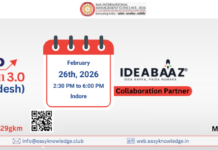Hyderabad | 11th May 2020: The Indus Entrepreneurs (TiE) – Hyderabad Chapter in the first of its webinar series on Education Sector – TiE Talks – organized an insightful webinar for global audience addressing some of the concerns students & educators are facing due to COVID-19.
The webinar saw an overwhelming number of attendees from various walks of the Education Sector from across India and abroad. TiE also organizes prominent programs to help students develop an entrepreneurial mindset at an early age namely – TYE (Tie Young Entrepreneurs for High School students) and TiE Grad (for college students).
The experts on the panel included Shri. Navin Mittal, IAS, Commissioner, Collegiate Education & Technical Education, Government of Telangana, Mr. K V Vishnu Raju, Chairman, Anjani Vishnu Holdings, Sri Vishnu Edu. Society, Dr. Snehal Pinto, Director, Ryan International Group of Institutions and was moderated by Mr. Ananth Rao, Charter Member of TiE Hyderabad & Chairman, SkillPro. In a 360-degree perspective covering Government, Higher Education, K12 Education and established entrepreneurs on education and e-learning provided the attendees, engaging and insightful conversation.
“Under TiE Talks, we have been bringing together virtual sessions on various trending topics most relevant to business leaders and start-ups. This webinar on “Transformation of Education & Role of E-Learning Post COVID-19 had a record participation and excitement”. President of TiE Hyderabad Sridhar Pinnapureddy, Founder and CEO – CtrlS Datacenters, said.
Adding his perspective, Navin Mittal, IAS Government of Telangana, said, “This phase of life has been very unprecedented, but we have also seen a positive transformation specifically in the education sector. The quantum of change which we are seeing both in the faculty, students, and institutions, would have taken at least 10-15 years, starting with the adoption of technology.”
Navin added further “Initiatives taken up in Telangana are to make use of this lockdown to complete the syllabus online which was not done due to early closure of the colleges. We have been monitoring and noticed that about 92% of faculty members have taken online classes consisting of 2 to 3 lectures a day using various technologies, witnessing improved students’ attendance. The challenge however for us is to reach students in the rural areas who might not have a seamless internet connection, we try to share recorded videos and learning material via email to make the process seamless.”
“When the world is grappling with COVID19 and with Physical distancing now becoming the norm, various challenges, and opportunities that come with securing a child’s future, education being one of them. Individuals and organizations are working round the clock to make the best of digital learning for students, faculty, and parents,” said Ananth Rao, Chairman SkillPro
Speaking at the webinar, Vishnu Raju, Chairman, Vishnu Edu. Society said. “There might be a lot of positives due to the pandemic, however, it also comes with its challenges. We cannot substitute a student’s experience like peer learning, a student-teacher connection, and encouraging campus feel, student spaces, sports facilities and much more may not be felt online except for delivering technical content which is the first challenge. The second challenge is the way to motivate the faculty to engage the students. Even though there are many LMS (Learning Management Systems) in place, how do we make it more interactive and grab their attention in the course of these online classes.”
Sharing her views, Dr. Snehal Pinto, Director, Ryan International Schools added “This transformation has seen the role of the teacher change drastically, no longer is she just delegated to be the one who gives but she is an active collaborator between the students and parents, all three stakeholders sharing responsibilities. We are all learning new skills and unlearning old ways. One of the first things we did was extensive training for the staff right at all levels. I think having an integrated ecosystem to cater to all sectors of the society, revisit our teaching methods would help us get through this phase without a glitch.”
The key take-away of the webinar for attendees were:
v E-learning is the new normal and needs to be adopted by all educators, faculty, parents, and students and get used to living with virtual
v Today’s need is to make online sessions more interactive by the faculty for higher engagement of students since tech tools provide for this
v Incorporate Blended Education accessing digital screens, viz. TV, Web, Mobile, etc. coupled with structured content, assessment, and analytics will help
v A wide range of age-groups, geographies, and socio-economic backgrounds will be our future consumers for online education
v E-learning tools which provide high-touch, human interactive personalization through Artificial Intelligence and Machine Learning tools will be the future.
To view the complete video of this webinar, please visit: tinyurl.com/tievideo






